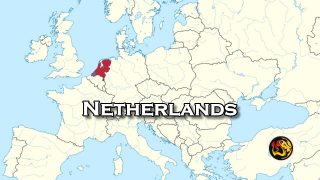
By Stefan J. Bos, Chief International Correspondent Worthy News
AMSTERDAM (Worthy News) – Banks in the Netherlands, one of Europe’s leading data center nations, appealed to customers on Wednesday to have cash “due to geopolitical tensions” after the government urged citizens to keep a backpack at home with emergency items.
The appeals came amid concerns about the escalating war in Ukraine, where Russian forces gain territory, with Moscow warning the West not to intervene.
Dutch banks noticed that the risk “of sabotage of important infrastructure such as payment systems or energy networks – has increased in recent years, “particularly due to threats from Russia.”
If such systems fail, digital payment transactions through credit or debit cards and money transfers may not be possible.
“Cash is then the only viable means of payment you can use in the supermarket. Gold and cryptocurrencies are generally not accepted,” noted De Telegraaf (The Telegraph) daily newspaper.
The national Nederlandsche Bank (Dutch Bank) previously warned that citizens should prepare for a situation in which electronic transactions “are completely down for a few days.”
Although the Dutch Banking Association claimed banks are “very well prepared” for cyber attacks, the Dutch Bank cautioned that it views cyber attacks “as one of the greatest risks for the Dutch financial system.”
Dutch experts said earlier this year that a cyber attack “on our energy network is a matter of time.”
FINANCIAL MATTERS
The Dutch Banking Association pledged that “integral advice on how best to arrange financial matters if a problem occurs with the payment infrastructure” will be provided.
In Sweden, the government advised people to have enough money “for a week’s worth of groceries at home.” The Dutch Bank advised people to keep “50 euros ($52) in a sock for emergencies.”
That seemed a small change for what is necessary for most families: In the Netherlands, an average household of 2.2 people spends 167 euros ($175) a week on food, drink, and tobacco, according to the Centraal Bureau voor de Statistiek (Central Agency for Statistics).
Budget institute Nibud advised the Dutch to have enough money in the house “to bridge a few days,” whereby the composition of the household and its wishes, including car fuel, was also essential.
That didn’t please the Verbond van Verzekeraars (the Dutch Association of Insurers), which feared people would keep too much money at home.
“That is risky in the event of a burglary as
the compensation for stolen cash varies between 250 euros ($263) and 500 euros ($525),” it said.
Yet if it were up to the Dutch government, every citizen would bring a backpack into the house with “items that would be useful in an emergency.” In addition to cash, this would include bottles of water, non-perishable food, a first aid kit, a flashlight, and blankets.
The appeals come amid mounting anxiety in Europe that the war in Ukraine will spread to other countries, with Moscow seeking vulnerable targets.
Copyright 1999-2026 Worthy News. This article was originally published on Worthy News and was reproduced with permission.
Latest News from Worthy News
Saudi Arabia has launched the largest reconstruction initiative in Syria since U.S. sanctions were lifted, positioning the kingdom as a central driver of Syria’s postwar recovery.
Ukrainian President Volodymyr Zelenskyy said the United States has given Kyiv and Moscow another deadline to reach a peace agreement, proposing that the nearly four-year war should end by June, as Russia escalates air strikes against Ukraine’s energy infrastructure.
Israeli Prime Minister Benjamin Netanyahu is scheduled to meet Wednesday with President Donald Trump at the White House, as negotiations with Iran enter a decisive and potentially volatile phase. The meeting, set for 11:00 a.m. Washington time, will mark Netanyahu’s seventh face-to-face encounter with Trump since the U.S. president began his second term, underscoring the unusually close relationship between the two leaders.
With the deadline to fund the Department of Homeland Security only days away, Democrats have refused an offer from the White House to strike a compromise over Immigrations and Customs Enforcement changes.
President Donald Trump is weighing deploying a second aircraft carrier to the Middle East as the U.S. continues talks with Iran over its nuclear program.
Ahead of the 2026 midterm elections, Republicans in Congress are pushing forward multiple bills that would standardize election security requirements nationwide.
Kenya has condemned as “unacceptable” the recruitment of its citizens to fight for Russia in Ukraine, amid reports that several Kenyans have been killed or wounded on the battlefield as the war approaches its fourth anniversary.







